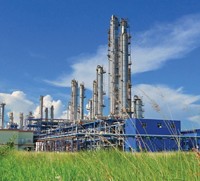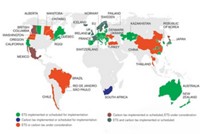Advertisement
Grab your lab coat. Let's get started
Welcome!
Welcome!
Create an account below to get 6 C&EN articles per month, receive newsletters and more - all free.
It seems this is your first time logging in online. Please enter the following information to continue.
As an ACS member you automatically get access to this site. All we need is few more details to create your reading experience.
Not you? Sign in with a different account.
Not you? Sign in with a different account.
ERROR 1
ERROR 1
ERROR 2
ERROR 2
ERROR 2
ERROR 2
ERROR 2
Password and Confirm password must match.
If you have an ACS member number, please enter it here so we can link this account to your membership. (optional)
ERROR 2
ACS values your privacy. By submitting your information, you are gaining access to C&EN and subscribing to our weekly newsletter. We use the information you provide to make your reading experience better, and we will never sell your data to third party members.
Business
Investors Buy Emission Credits
Purchase gets brokers involved in global warming gas cuts in a big way
by Marc S. Reisch
September 18, 2006
| A version of this story appeared in
Volume 84, Issue 38

A consortium of investors has arranged to purchase 29.5 million metric tons of CO2-equivalent emission reduction credits (CERCs) over six years in a deal valued at about $600 million at current prices.
The deal, arranged by London-based Climate Change Capital, includes Deutsche Bank, Morgan Stanley, and Centrica, a U.K.-based energy supplier. Climate Change Capital's Carbon Fund, which just raised $830 million from investors, will also invest in the credits.
The CERCs will come from Zhejiang Juhua Co., a Chinese firm that generates HFC-23 (trifluoromethane) as a by-product of making HCFC-22 (chlorodifluoromethane), a refrigerant used in room air conditioners. HFC-23 has a global warming potential 11,700 times greater than that of carbon dioxide. The Zhejiang deal follows a similar one backed by the World Bank (C&EN, Sept. 4, page 8).
Purchase of Zhejiang's CERCs will help underwrite a facility to decompose HFC-23 now vented into the atmosphere at the firm's 16,000-metric-ton-per-year HCFC-22 production line just outside of Quzhou City in Zhejiang province. The Chinese government will use revenues from the CERCs to underwrite other environmental projects in China.
According to United Nations documents certifying the project, JMD Greenhouse-Gas Reduction Co., partly owned by Japanese trading firm Marubeni, will install the steam decomposition facility.
Climate Change Capital says the consortium's CERCs will be eligible for purchase and sale on the electronic trading system set up under the European Emissions Trading Scheme. European Union firms can use the credits to offset emissions above their allotment under rules put in place to meet Kyoto protocol targets.
The consortium is hoping that the CERCs, worth $20.32 apiece today, will be more valuable in the future. According to the European Topic Centre on Air & Climate Change, the 15 pre-2004 European Union member states will not be able to achieve their greenhouse gas emission reduction targets without purchasing CERCs from other countries.




Join the conversation
Contact the reporter
Submit a Letter to the Editor for publication
Engage with us on Twitter